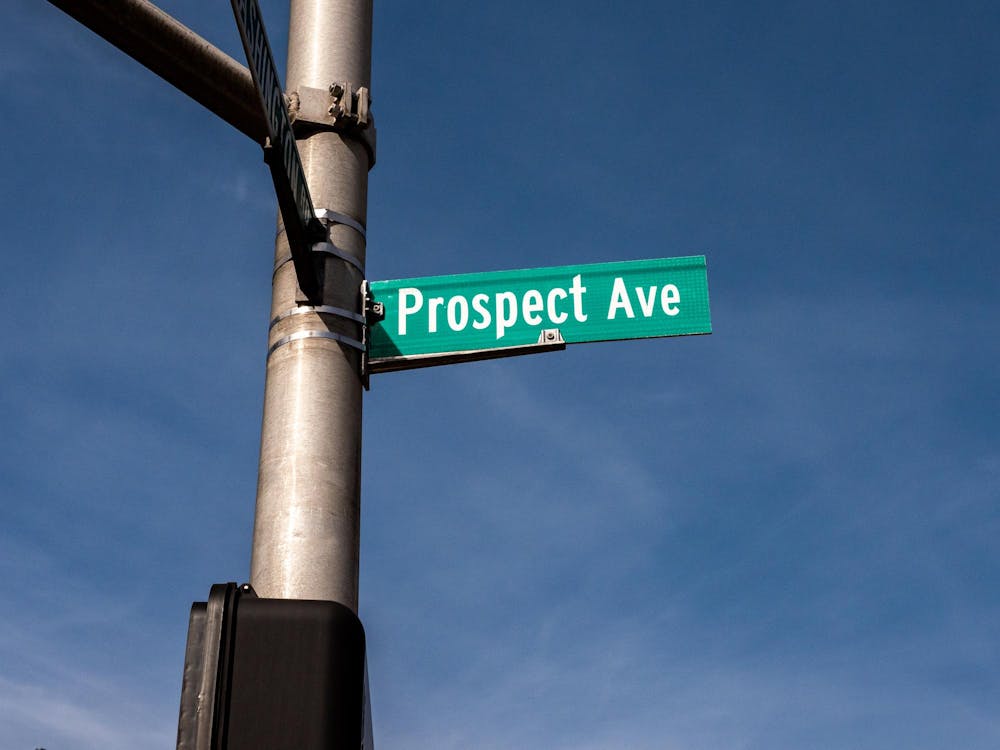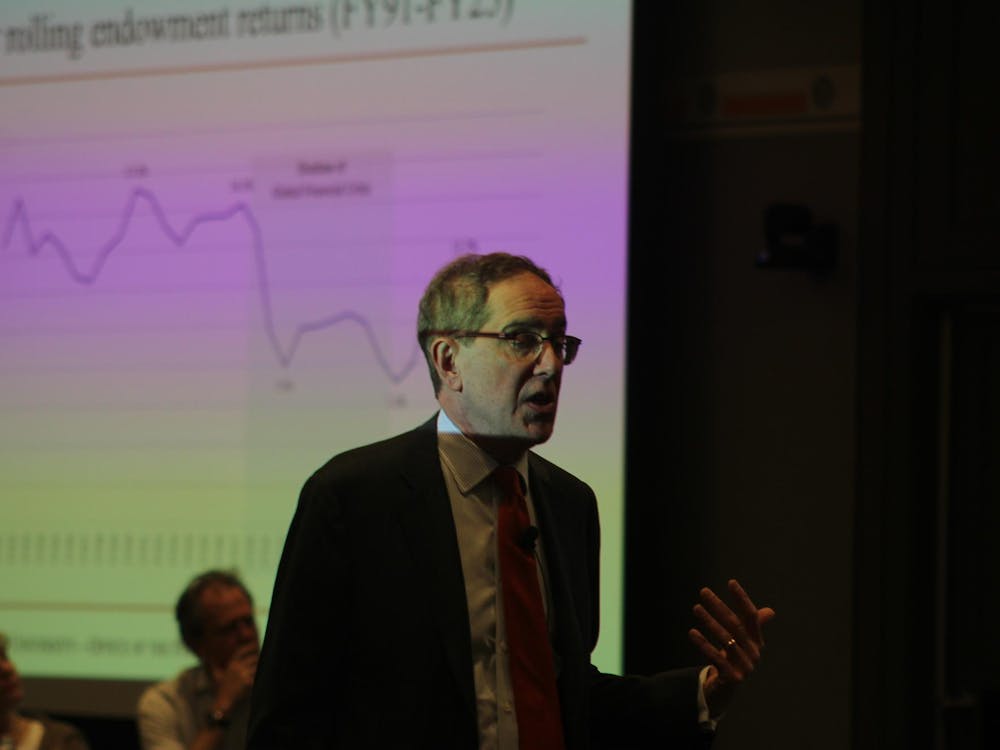"There are something like six or seven sentences . . . that are the sentences of other writers."
These sound like the pleading words of a college student accused of plagiarism, trying to minimize the significance of his appropriation of others' words. But in fact, the quote above is from a recent lecture by Stephen Ambrose, a historian famous for his books interweaving history and narrative.
Ambrose is an emeritus professor of history at the University of New Orleans who has published nine best-selling books in the last seven years, far outstripping the pace of historians in the academic world.
Most historians spend years writing each of their books, only to find their work relegated to the back shelves of specialized college bookstores. By contrast, Ambrose has often found his books on New York Times bestseller lists.
Critics have, however, charged that Ambrose tends to imbue the soldiers and explorers in his books with a certain Ambrosial quality — painting them as heroes without subjecting them to rigorous historical analysis.
And now, critics have a second charge: plagiarism in four or more of Ambrose's books. Those who found it implausible that one man could write so much, so well, and in so short a span of time have been vindicated.
Ambrose's most recent best-seller, "The Wild Blue," which was published last year, started the plagiarism snowball rolling. Fred Barnes, a senior editor at the Weekly Standard and frequent TV commentator, pointed out that parts of Ambrose's book bore striking similarities to an earlier-published history on the same topic: B-24 crews flying over Germany. Whole sentences from the earlier book, "The Wings of Morning" by University of Pennsylvania history professor Thomas Childers, appear in Ambrose's book unadorned by quotation marks.
Bob Minzesheimer, reporting for USA Today, pointed to perhaps the most striking example of Ambrose's appropriation. The following is from Childers' book, which was published in 1996:

"The bombardier, navigator, and nose-turret gunner were forced to squat down, almost on hands and knees, and sidle up to their stations through the nose wheel well of the ship. Once inside the three men, fully dressed in their bulky flying gear, would be squeezed into a cramped compartment."
Ambrose, in his book, claims the following words as his own:
"The bombardier, navigator, and nose turret gunner were forced to squat down, almost on hands and knees, and sidle up to their stations through the nosewheel well of the ship. Inside, the tree men had to squeeze themselves into a cramped compartment."
Minzesheimer, spurred on by reports of similar attribution problems in other Ambrose works, found examples of recycled prose in three more of Ambrose's popular histories – Crazy Horse and Custer, Citizen Soldiers and Nixon: Ruin and Recovery 1973-1990. In each case, as in The Wild Blue, Ambrose credited the source of his prose in a bibliography or footnotes but stopped short of placing another author's words in quotation marks.

While no one can prove that Ambrose deliberately neglected to include quotation marks, the rules governing attribution in the world of arts and letters are hard and fast. Each book to which an author turns during research is more than just a bunch of ideas. It is, as Kurt Vonnegut might have said, an idiosyncratic sequence of letters: the particular way a writer puts words in order are as much that author's creation as are the underlying ideas those words express.
When the Weekly Standard went to press with the Ambrose story, it got letters back from readers pointing out that Doris Kearns Goodwin, author of "The Fitzgeralds and the Kennedys", has come under similar fire for her liberal use of other authors' prose. Like Ambrose, she footnoted her source – in this case a book by fellow historian Lynne McTaggart when quoting McTaggart's work.
Goodwin's book also contained borrowed prose not placed in quotes. Goodwin blamed poor note-taking and explained that she and McTaggart reached a "private settlement" resolving the matter. But when the Weekly Standard investigated, they found that Goodwin never put McTaggart's words in quotation marks, even after settling with McTaggart.
While Ambrose has acknowledged that he erred in his citation methods, he has not admitted anything like the systematic pattern of plagiarism others see in his work.
University history professor James McPherson said he thinks Ambrose is "more culpable" than Goodwin. While Goodwin has been criticized with respect to only one of her books, Ambrose's critics have found attribution problems throughout his works, he explained.
McPherson said that while Goodwin may have made an honest mistake, Ambrose was "a step or two beyond careless."
"Clearly, if a professor found the degree of similarity in phrasing and wording [in a student's work] that has been found in Steve Ambrose's case, some kind of sanction or disciplining would be in order."
Jackson Lears, a Rutgers historian, told the U.S. News and World Report that Ambrose's failings would have meant harsher consequences in the academic world: "if he'd been a tenured professor, his university career would have been ended by this."
If Ambrose were a Princeton student, he would face disciplinary action for his citation methods. The Rights, Rules and Responsibilities booklet, whose pages contain most of the rules on student conduct ,devotes considerable attention to spelling out the dos and don'ts of writing papers.
"Any quotation, however small, must be placed in quotation marks or clearly indented beyond the regular margin . . . Any sentence or phrase which is not the original work of the student must be acknowledged."
The rules even talk explicitly about Mr. Ambrose's type of bibliographic shortfall. "[T]he use of a footnote at the end of a sentence or paragraph in which only minor word changes have been made from the original source" cannot "be considered 'proper acknowledgment.' The extent of indebtedness to the author must be made clear."
Dean Marianne Water-bury, who serves on the Committee on Discipline, said that in cases like these, with a pattern of omitted quotation marks, Ambrose and Goodwin could have both been suspended for a year or more. Once the Committee decides that academic fraud has taken place, the guidelines describe a year's suspension as the minimum normal penalty.
Ambrose and his defenders have blamed his failure to attribute his sources on the superhuman pace at which he has churned out his books.
According to University guidelines, however, "the only adequate defense for a student accused of an academic violation is that the work in question does not, in fact, constitute a violation. Neither the defense that the student was ignorant of the regulations concerning academic violations nor the defense that the student was under pressure at the time the violation was committed is considered an adequate defense."
Sociology professor Miguel Centeno, who until recently used one of Ambrose's books in his course on the Western way of war, stopped using Ambrose's books in his classes well before the accusations of plagiarism surfaced, because he found Ambrose did not keep a critical perspective on his subjects.
Centeno explained, "It is precisely because it is relatively easy and because it may also appear attractive that we need to establish absolute standards for faculty and students."







